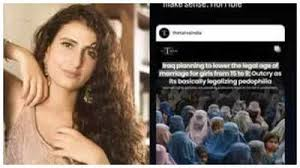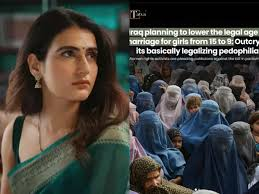
Table of Contents
Fatima Sana Shaikh, the talented and outspoken actress known for her powerful roles in films like Dangal and Thugs of Hindostan, recently made headlines for her strong reaction to a controversial marriage law proposal in Iraq. The proposal, which has sparked outrage and condemnation from activists and human rights organizations worldwide, would allow girls as young as nine to be married off with parental consent. Fatima, who has never shied away from speaking out on social issues, took to social media to express her dismay and anger at the “horrible” proposal, highlighting the broader implications of such laws on women’s rights and the global fight for gender equality.
The Controversial Law Proposal
The proposed law in Iraq, known as the Jaafari Personal Status Law, is a stark departure from international norms regarding the protection of children and women’s rights. If passed, it would legalize the marriage of girls as young as nine, provided their parents consent to the union. This proposal is based on interpretations of Islamic jurisprudence by some sects, which argue that girls reach maturity at this age.
The law has drawn widespread criticism from both within Iraq and internationally. Human rights organizations, including the United Nations, have condemned the proposal as a violation of the rights of children and a dangerous step backward for gender equality in Iraq. Critics argue that such a law would effectively legalize child marriage, robbing young girls of their childhood and exposing them to a lifetime of abuse, exploitation, and health risks.
Fatima Sana Shaikh’s Response
Fatima Sana Shaikh, known for her strong and vocal stance on social issues, was quick to react to the news. Using her platform to shed light on the issue, Fatima expressed her horror and disgust at the proposal. In a series of posts on her social media accounts, she described the proposed law as “horrible” and “unthinkable,” emphasizing the devastating impact it would have on young girls in Iraq.
“How can we, in the 21st century, even consider a law that allows children to be married off at such a young age? This is not just a step back; it is an assault on the basic rights of girls,” Fatima wrote in one of her posts. Her words resonated with many of her followers, who praised her for speaking out against such an egregious violation of human rights.
Fatima’s reaction is reflective of her commitment to using her influence for social good. Over the years, she has consistently used her platform to raise awareness about issues ranging from gender equality to mental health. Her outspokenness on the Iraq marriage law proposal underscores her belief that celebrities have a responsibility to speak out on important social issues, especially those that affect vulnerable populations.
The Global Outcry Against the Law
Fatima’s reaction is part of a larger global outcry against the proposed law in Iraq. Activists, politicians, and organizations around the world have condemned the law as a violation of human rights, particularly the rights of women and children. The law has been described as “barbaric” and “medieval,” with many calling on the international community to intervene and pressure the Iraqi government to abandon the proposal.
In addition to the obvious human rights concerns, critics of the law argue that it would have far-reaching negative consequences for Iraqi society. Child marriage is associated with numerous negative outcomes, including higher rates of maternal and infant mortality, lower levels of education, and increased poverty. By allowing girls to be married off at such a young age, the law would perpetuate cycles of poverty and gender inequality, undermining efforts to build a more just and equitable society in Iraq.
The Role of Celebrities in Social Advocacy
Fatima Sana Shaikh’s response to the Iraq marriage law proposal highlights the growing role of celebrities in social advocacy. In today’s interconnected world, celebrities have the ability to reach millions of people through social media, making them powerful voices for change. Many celebrities, like Fatima, have recognized the importance of using their platforms to speak out on social issues, whether it’s gender equality, climate change, or human rights.
By speaking out against the Iraq marriage law proposal, Fatima is not only raising awareness about a critical issue but also inspiring others to take action. Her words have the power to influence public opinion and put pressure on policymakers to reconsider harmful legislation. This kind of advocacy is crucial in the fight for social justice, as it helps to amplify the voices of those who are often marginalized and overlooked.
The Importance of Protecting Children’s Rights
At the heart of the controversy surrounding the Iraq marriage law proposal is the fundamental issue of children’s rights. International law, including the United Nations Convention on the Rights of the Child (UNCRC), recognizes the right of children to be protected from exploitation, abuse, and harmful practices such as child marriage. Laws that allow or facilitate child marriage are in direct violation of these rights and have devastating consequences for the children involved.
Child marriage is a practice that disproportionately affects girls, often denying them their right to education, health, and a life free from violence and exploitation. It is a form of gender-based violence that perpetuates inequality and discrimination against women and girls. By speaking out against the Iraq marriage law proposal, Fatima Sana Shaikh is drawing attention to the urgent need to protect the rights of children and ensure that they are not subjected to harmful practices like child marriage.
The Broader Fight for Gender Equality
The Iraq marriage law proposal is not just an isolated issue; it is part of the broader struggle for gender equality and women’s rights around the world. Laws and practices that discriminate against women and girls are still prevalent in many parts of the world, and the fight to eliminate these injustices is ongoing.








